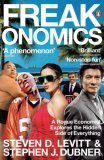Summary | Excerpt | Reading Guide | Reviews | Readalikes | Genres & Themes | Author Bio
A Rogue Economist Explores the Hidden Side of Everything

Critics' Opinion:
Readers' Opinion:
First Published:
Apr 2005, 256 pages
Paperback:
Apr 2006, 256 pages
Introduction:
The Hidden Side of Everything
Anyone living in the United States in the early 1990s and paying even a
whisper of attention to the nightly news or a daily paper could be forgiven
for having been scared out of his skin.
The culprit was crime. It had been rising relentlessly -- a graph
plotting the crime rate in any American city over recent decades looked like
a ski slope in profile -- and it seemed now to herald the end of the world
as we knew it. Death by gunfire, intentional and otherwise, had become
commonplace. So too had carjacking and crack dealing, robbery and rape.
Violent crime was a gruesome, constant companion. And things were about to
get even worse. Much worse. All the experts were saying so.
The cause was the so-called superpredator. For a time, he was everywhere.
Glowering from the cover of newsweeklies. Swaggering his way through foot
thick government reports. He was a scrawny, big city teenager with a cheap
gun in his hand and nothing in his heart but ruthlessness. There were
thousands out there just like him, we were told, a generation of killers
about to hurl the country into deepest chaos. In 1995 the criminologist
James Alan Fox wrote a report for the U.S. attorney general that grimly
detailed the coming spike in murders by teenagers. Fox proposed optimistic
and pessimistic scenarios. In the optimistic scenario, he believed, the rate
of teen homicides would rise another 15 percent over the next decade; in the
pessimistic scenario, it would more than double. "The next crime wave will
get so bad," he said, "that it will make 1995 look like the good old days."
Other criminologists, political scientists, and similarly learned
forecasters laid out the same horrible future, as did President Clinton. "We
know we've got about six years to turn this juvenile crime thing around,"
Clinton said, "or our country is going to be living with chaos. And my
successors will not be giving speeches about the wonderful opportunities of
the global economy; they'll be trying to keep body and soul together for
people on the streets of these cities." The smart money was plainly on the
criminals.
And then, instead of going up and up, crime began to fall. And fall and
fall and fall some more. The crime drop was startling in several respects.
It was ubiquitous, with every category of crime falling in every part of the
country. It was persistent, with incremental decreases year after year. And
it was entirely unanticipated -- especially by the very experts who had been
predicting the opposite.
The magnitude of the reversal was astounding. The teenage murder rate,
instead of rising 100 percent or even 15 percent as James Alan Fox had
warned, fell more than 50 percent within five years. By 2000 the overall
murder rate in the United States had dropped to its lowest level in
thirty-five years. So had the rate of just about every other sort of crime,
from assault to car theft.
Even though the experts had failed to anticipate the crime drop -- which
was in fact well under way even as they made their horrifying predictions --
they now hurried to explain it. Most of their theories sounded perfectly
logical. It was the roaring 1990s economy, they said, that helped turn back
crime. It was the proliferation of gun control laws, they said. It was the
sort of innovative policing strategies put into place in New York City,
where murders fell from 2245 in 1990 to 596 in 2003.
These theories were not only logical; they were also encouraging,
for they attributed the crime drop to specific and recent human initiatives.
If it was gun control and clever police strategies and better paying jobs
that quelled crime -- well then, the power to stop criminals had been within
our reach all along. As it would be the next time, God forbid, that crime
got so bad.
The foregoing is excerpted from Freakonomics by Steven D. Levitt and Stephen J. Dubner. All rights reserved. No part of this book may be used or reproduced without written permission from HarperCollins Publishers, 10 East 53rd Street, New York, NY 10022





The Funeral Cryer by Wenyan Lu
Debut novelist Wenyan Lu brings us this witty yet profound story about one woman's midlife reawakening in contemporary rural China.
Your guide toexceptional books
BookBrowse seeks out and recommends the best in contemporary fiction and nonfiction—books that not only engage and entertain but also deepen our understanding of ourselves and the world around us.